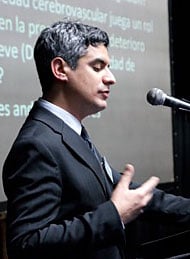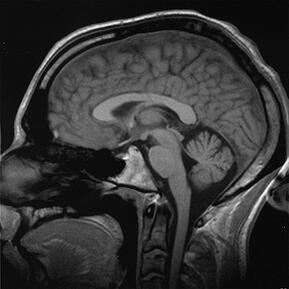New research from Columbia University’s Taub Institute for Research on Alzheimer’s Disease and the Aging Brain shows that silent strokes may be the cause of memory loss in aging people. Dr. Adam M. Brickman, Ph.D. and Herbert Irving Assistant Professor of Neuropsychology at Columbia University College of Physicians and Surgeons, told Neurology that what’s new about his research is that it “examines silent strokes and hippocampal shrinkage simultaneously.” In the past, experts believed memory loss in the elderly was a result of deterioration in the hippocampus. While there’s truth in this logic, Dr. Brickman says that silent strokes (strokes so small they may go unnoticed) also contribute to the problem of memory loss in older people.

Dr. Brickman (photo courtesy of Columbia)
Characteristically, strokes have been known to affect mental abilities like information processing speed or attention, but not necessarily memory loss. To test the new theory, researchers conducted a study with over 650 dementia-free people aged 65 or older. The subjects were given MRI brain scans and took tests to measure their memory, language, information processing speed and visual perception. Researchers looked at the MRIs for evidence of silent strokes, which show up as dark holes indicating tissue loss. Of the 658 people tested, 174 were found to have had strokes. Those 174 performed worse on memory tests irrespective of how large their hippocampus was, though silent strokes were linked with a smaller hippocampus size.
Dr. Brickman said: "Given that conditions like Alzheimer's disease are defined mainly by memory problems, our results may lead to further insight into what causes symptoms and the development of new interventions for prevention. Since silent strokes and the volume of the hippocampus appeared to be associated with memory loss separately in our study, our results also support stroke prevention as a means for staving off memory problems." In light of these new findings, patients worried about memory loss should make sure they and their doctors are thoroughly managing their vascular health in order to prevent cognitive decline. Silent strokes are potentially preventable, and Dr. Brickman advises people to eat healthfully as well as take diabetes and high blood pressure medication (if needed) to maintain their blood vessel health.

(Photo courtesy of Wikimedia Commons)
Biotechnology Calendar, Inc. is a science research marketing and events-planning company that organizes university tradeshows nationwide. If you are a science researcher or lab supplier interested in networking at Columbia University our 2nd Annual BioResearch Product Faire event will be tentatvely held on Monday October 15, 2012. Our shows are catered and always enlightening about what new products are available in the science research industry.


